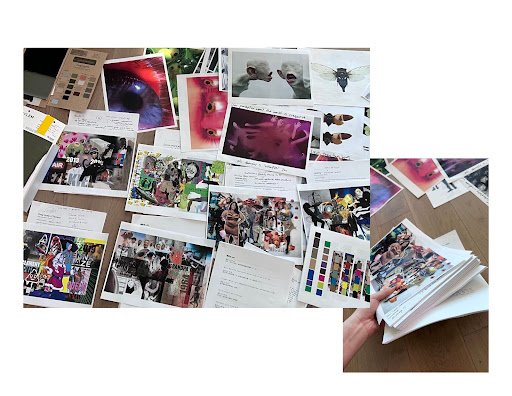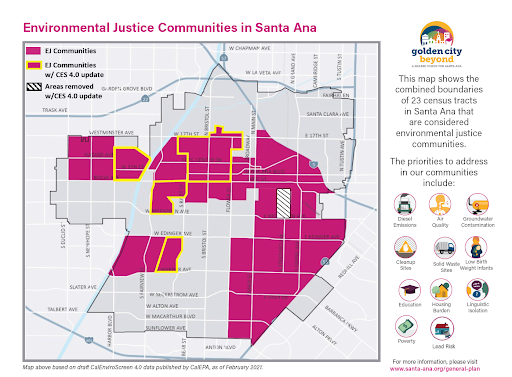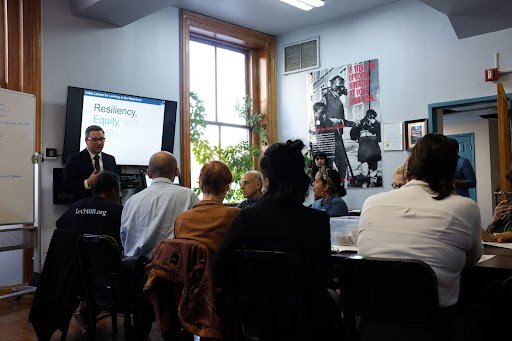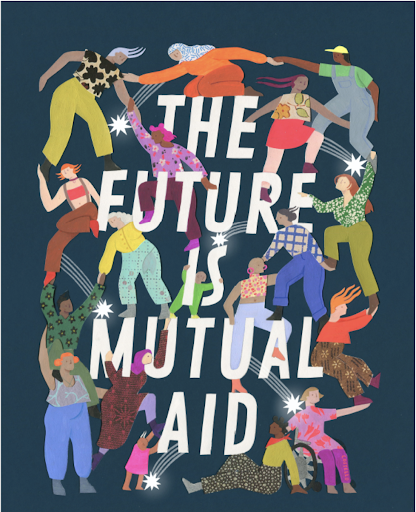2021-2022 Tishman Center Student Awardees
In 2016, the Tishman Environment and Design Center created student awards to help support the work of students doing research and projects around environmental and climate justice. We are thrilled to announce the Tishman Center’s 2021-2022 Student Award grantees, seven projects carried out by ten students who represent almost all of the colleges across the New School. These projects embody the transdisciplinary approach that both the university and the Tishman Center embrace as the best way to address the issues of our time.
Hanwei Su, Fashion Design, BFA
Ziyu Zhang, Fashion Management, MPS
Project: The Mind's Eye
The Mind’s Eye is a ready-to-wear fashion collection that aims to increase understanding of the visually impaired community. Su and Zhang will conduct interviews of visually impaired people from all walks of life, collecting stories to embed into their designs through immersive technology such as QR codes. By weaving these voices into their garments, they hope to accomplish two goals: first, to educate the public about the visually impaired community and showcase a multi-faceted, rich image of the group instead of the stereotypical image meant to evoke pity. Second, they want to show how fashion can indeed be a part of the solution, and how designers can tie humanitarian issues with ready-to-wear.
Julián Muro, Composition, MM
Project: La Tierra, una criatura
In my life, I have had enormous privileges that come from my upbringing in Patagonia, where I worked as a sherpa in mountain cottages, to living on the Llusanés plateau without drinkable water, heated solely on wood, and with the nearest neighbor 1,5 km away. Seeking to bring some of the things I know and love to wider audiences, I started La Tierra, una criatura: a project that consists of field recordings gathered during my travels to create soundscapes combined with visual poetry as a starting point for improvisation and collaboration. I think of this as a way to appreciate nature in a creative process in which the Earth is the main collaborator.
I look forward to furthering this project by creating new material, both visual poetry and soundscapes, to invite more artists to engage in it and with the dream to have a substantial piece that may be performed in the year to come.
Enrique Valencia, International Affairs, MS
Project: Evaluating Meaningful Engagement Under Environmental Justice Mandates: A Case Study of California’s SB1000 Implementation in Santa Ana
California’s Senate Bill 1000 requires general land use plans to integrate environmental justice (EJ) policies throughout. This research explores the City of Santa Ana’s general plan update from 2014-2020 to understand whether SB1000 contributed to meaningful engagement of community concerns regarding EJ. Through a combination of gray literature review, semi-structured interviews, and thematic analysis, this research shows the limitations of SB1000 as a method to provide meaningful engagement of EJ communities in Santa Ana.
This study contributes to the growing body of scholarship that documents white supremacy in planning and its harmful effects on low-income and BIPOC communities. It aims to provide a synthesis of successes and challenges of EJ planning in Santa Ana that can inform future practice.
Dillon Bernard, Eugene Lang, Journalism + Design, BA
Project: Content By Us #AmplifyClimate
Content By Us is a youth-led media lab created to empower young, multicultural storytellers who use digital media and narratives as a force for self-empowerment and transformative justice. On its mission to empower young Black and Brown content creators and cultural organizers, Content By Us is expanding the digital media infrastructure of social justice movements by providing critical digital amplification and content production support. As we accomplish this mission, we are developing an issue-specific amplification network for climate, dubbed #AmplifyClimate. We will complete an audit of the climate justice space by interviewing key communications team members from prospective and current partners about their views on what’s needed in terms of climate communications.
Veronica Olivotto, Public and Urban Policy, PhD
Katinka Wijsman, Politics, PhD
Project: Procedural Justice and Participation: Insights from Theory and Practice
This project seeks a deeper engagement of policymakers and academics with what participation means theoretically and empirically. The literature on procedural justice (PJ) is scattered across many disciplines, and lacks a set of systematic underlying principles. So we ask: How can an interdisciplinary literature review inform what PJ principles matter in environmental work? What do empirical Environmental Justice (EJ) studies say about what matters on a case by case basis, instead?
The study also asks, according to EJ practitioners in NYC, what matters for PJ in urban resilience to environmental threats? We plan to conduct interviews with RISE and other frontline groups in NYC to probe their practical understandings of PJ. Our research will help prepare academics and policymakers working with EJ organizations, so that EJ leaders can avoid explaining their core values time and again. Ultimately, we hope that this work will contribute to solidarity and mutuality by sharing EJ organizations’ goals and values about PJ with collaborators.
Evan Henritze, NSSR, Clinical Psychology PhD, May 2024
Sonora Goldman, NSSR, Psychology MA, May 2022
Project: Addressing the Moral Injuries of Climate Injustice: Ecological Embeddedness and Community Cohesion as Pathways to Collective Action
The climate crisis contributes to ever-present feelings of dread, uncertainty, and powerlessness, pushing the bounds of existing trauma frameworks. One useful but understudied framework to understand climate trauma is that of moral injury (MI): the experience of betrayal that results from engaging or witnessing actions that violate one’s beliefs that often leads to feelings of guilt, shame, and anger. The MI framework addresses the psychological complexity of the crisis: individuals can feel both responsible and powerless because we each contribute to climate change, and yet are embedded within unsustainable systems.
Through surveys, this project will examine patterns in experiences of climate-related MI based on social identities such as class, race, gender, age, and degree of activism. It will also bring these statistics to life by conducting a series of qualitative interviews exploring the subjective experience of climate change MI as well as their sense of community cohesion. The final outcome will synthesize the quantitative and qualitative research into a visual representation of the differing “narratives” of moral injury related to climate change.
Cynthia Golembeski, Public and Urban Policy, PhD
Project: Carceral and Climate Crises: Advancing health equity solutions by addressing the impact of the climate crisis on people involved with the criminal legal system
This project will include a critical analysis of key policies and court cases associated with climate related risks in criminal legal institutions. Existing data will be used to map zones within which criminal legal systems are most vulnerable to climate induced disasters and extreme temperatures.
This project focuses on extremely vulnerable populations that are often neglected in discussions of the health effects of climate change. We seek to provide evidence and analysis that will support positive policy changes to prevent injury, illness and death for people who are incarcerated, correctional staff, and their families and communities. Based on our research, we will make recommendations to advance equity and environmental justice in these critical areas of concern. We will work within New York and more broadly and incorporate the voices of those directly impacted.







